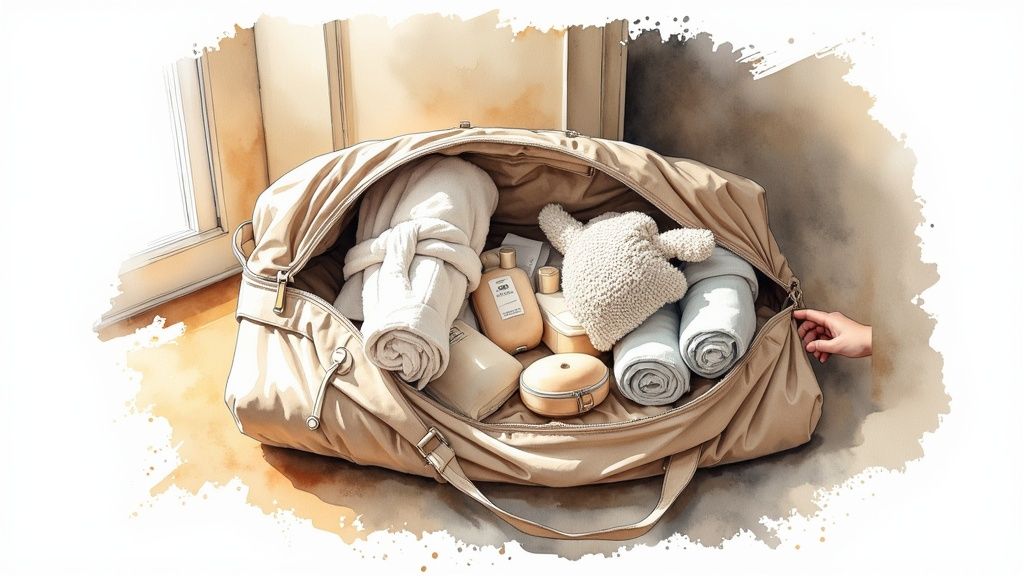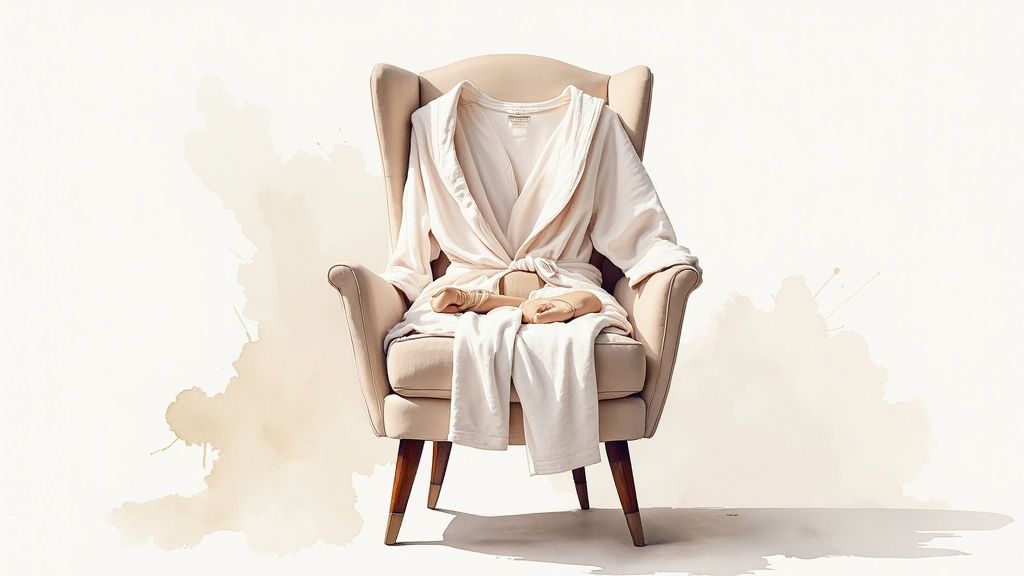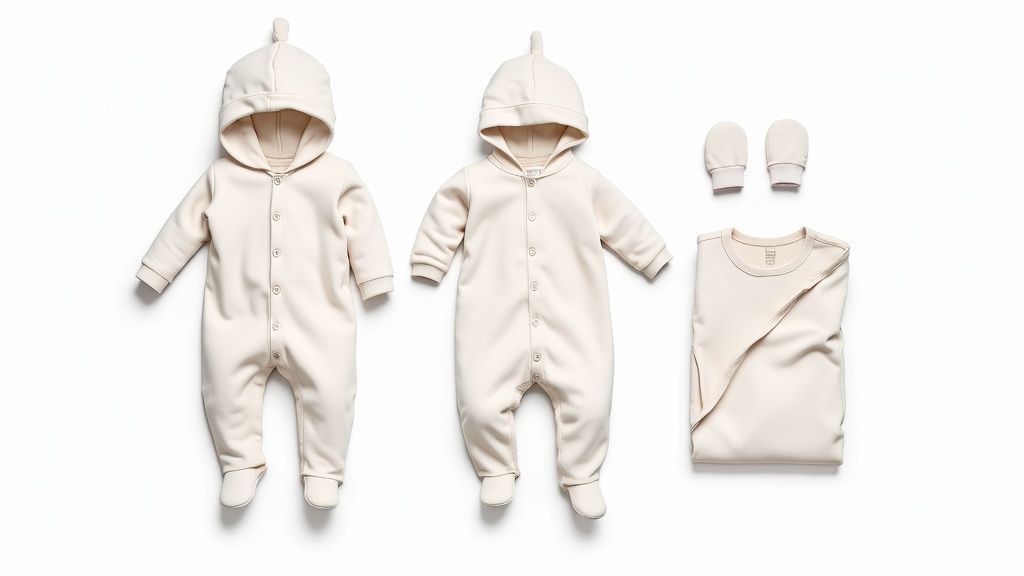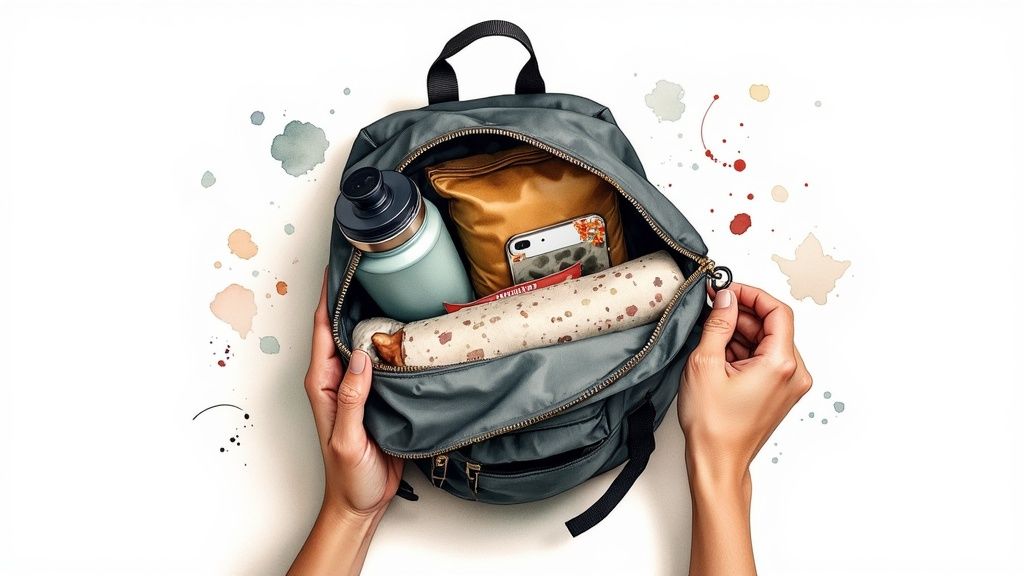Packing your hospital bag is one of the final, beautiful rituals before you meet your baby. It’s the moment when all the anticipation starts to feel incredibly real. At a bare minimum, you'll need your important documents, a comfy going-home outfit for you, a safe car seat and a sweet first outfit for your baby, and some snacks for your support person.
Getting Your Hospital Bag Ready for the Big Day

Welcome, soon-to-be-parent, to one of the most exciting parts of your pregnancy journey! Packing your hospital bag isn't just about checking items off a list. It’s about mindfully creating your own personal comfort kit, filled with little things that will help your hospital stay feel a bit more like home.
Having that bag packed and sitting by the door can bring such a sense of calm during what can be a beautifully chaotic time. It frees you up to focus on the incredible experience of meeting your little one, knowing everything you need is ready and waiting. Let’s get you packed, one comforting item at a time.
When Should You Pack Your Hospital Bag?
Figuring out the "right" time to pack can feel like a guessing game, but there's a general sweet spot that helps you feel ready without being too early. For most pregnancies, aiming to have everything squared away by the time you're considered full-term is a great goal.
Most experts suggest having your bag packed and ready between 36 and 38 weeks of pregnancy. If you're in a higher-risk category, like expecting multiples or have other medical considerations, it's wise to move that timeline up a bit, perhaps to around 35 weeks. This buffer ensures you’re not scrambling if your little one decides to make an early debut. You can find more great tips on preparing for your hospital stay on ergobaby.com.
Think of it this way: having your bag packed is like having your car seat installed. It’s one less thing to worry about when labor begins, giving you the freedom to be fully present in the moment.
The Absolute Must-Haves
If you're short on time or just feeling completely overwhelmed by all the lists out there, start here. This is the simple, non-negotiable list of what you'll definitely need.
Here are the absolute must-have items for the birthing parent, baby, and your partner. Consider these your non-negotiables.
The Ultimate Hospital Bag Quick-Start Checklist
| For the Birthing Parent | For the New Baby | For the Support Person |
|---|---|---|
| ID & Insurance Card | A properly installed car seat | A change of comfortable clothes |
| Comfy going-home outfit (think soft, loose pants!) | A special going-home outfit | Phone and charger |
| Phone & extra-long charging cable | A soft hat and maybe a blanket (weather dependent) | Essential toiletries (toothbrush, deodorant) |
| Any essential personal toiletries | - | A stash of favorite snacks and drinks |
This quick checklist covers the essentials to get you through the door and comfortably on your way home. Everything else is just a bonus to make your stay even better.
What to Pack for Mom: Comfort and Recovery Essentials

While your new baby is undoubtedly the star of the show, this part of the hospital bag is all about you—your comfort, your recovery, and your well-being. The hospital provides the basics, but having your own familiar things can turn a sterile room into your own little recovery nest.
Think of it as your toolkit for feeling human during one of life's most intense (and incredible) experiences. Slipping into your own cozy robe instead of a starchy hospital gown? A game-changer. Having your favorite lip balm on hand during labor? A tiny detail that makes a world of difference.
Let's dive into what seasoned moms swear by for a much more comfortable hospital stay.
Post-Delivery Clothing: Think Soft and Gentle
Your body has just done something truly amazing, and it deserves to be wrapped in pure comfort. That standard-issue hospital gown is functional, but it’s definitely not cozy. Packing a few thoughtfully chosen clothing items will help you feel so much more like yourself.
Focus on soft, forgiving fabrics and a loose fit. Breathable cotton or bamboo is a dream against sensitive skin. Think soft joggers, pajama sets with button-down tops (for easy nursing access!), and a cozy cardigan or robe you can throw over anything. Hospital rooms can get surprisingly chilly, so having your own layers is key.
Here are the non-negotiables for your bag:
- A Dark-Colored Robe: This is a must-have for walking the halls or when visitors pop in. A dark color is super practical for hiding any inevitable leaks or spills.
- Nursing-Friendly PJs: If you plan to breastfeed, pajamas or a nightgown with buttons or easy-access panels will be your best friend during those round-the-clock newborn feeds.
- High-Waisted Underwear: The hospital will give you mesh underwear (they are surprisingly useful!), but many moms feel much better with the gentle support of their own high-waisted cotton briefs. This style is especially important if you have a C-section, as it won't rub against your incision. Pack at least 5-7 pairs.
- Cozy, Non-Slip Socks or Slippers: Hospital floors are cold and can be slick. A few pairs of warm, grippy socks or easy-to-slide-on slippers are essential for keeping your feet warm and helping you feel steady.
The goal here is simple: choose clothes that ask nothing of your body. We're talking stretchy waistbands, super-soft fabrics, and absolutely zero restriction. Your body needs to rest, and your clothes should be on board with that plan.
Your Personal Toiletry Kit
This is one of the easiest ways to feel refreshed and cared for during your stay. That first postpartum shower is a moment you'll remember forever, and having your own familiar-smelling shampoo and body wash makes it feel downright luxurious.
Pack travel-sized versions of your go-to products to save space. Just toss them all in a small bag so it’s easy to grab when you’re ready.
The Ultimate Toiletry Checklist:
- Lip Balm: Honestly, this is a top-tier essential! Hospital air is incredibly dry, and labor can leave your lips feeling seriously chapped. Keep one in your pocket at all times.
- Your Favorite Body Wash & Shampoo: Smelling like "home" is a small but powerful comfort.
- Dry Shampoo: For those moments when a full shower feels like climbing a mountain, a spritz of dry shampoo is a total lifesaver.
- Face Wipes or Gentle Cleanser: Perfect for a quick refresh without even having to leave your bed.
- Toothbrush and Toothpaste: Nothing feels better than brushing your teeth after a long night. Don’t forget these!
- Hair Ties & a Brush: A simple way to keep your hair out of your face and feel a little more put-together.
- Nipple Cream: If you're planning to breastfeed, have a good lanolin or plant-based nipple cream ready to go. It can help soothe soreness right from the start.
- Your Own Towel: Hospital towels are famously small and scratchy. Bringing a soft, dark-colored towel from home is a little luxury you will be so thankful for.
For a curated selection of items designed with your comfort in mind, feel free to explore some of our favorite products for moms. Packing these things is an act of self-care, ensuring you have everything you need to recover and bond with your baby in total comfort.
Packing for Your Newborn: First Outfits and Necessities

Alright, this is easily the most fun and heartwarming part of packing—picking out those impossibly tiny outfits for your new arrival. While the hospital will have the basics covered with a simple onesie and some receiving blankets, bringing your own hand-picked items feels so special. It’s all about wrapping your baby in pure softness and comfort from their very first moments.
Think simple, practical, and incredibly soft. Your newborn’s skin is brand new and super delicate, so stick with gentle, breathable fabrics like organic cotton. The goal isn't to pack their entire dresser, but to have a few key pieces that make those first few days a little cozier for everyone.
Choosing the Right First Outfits
When it comes to baby clothes for the hospital, less is truly more. You can skip the elaborate outfits with lots of tiny snaps or buttons. Instead, focus on clothes that are a breeze to get on and off, especially when you’re navigating those surprisingly frequent diaper changes.
A practical tip from seasoned parents: pack a couple of different sizes. You really have no idea how big your little one will be until they’re here! Having an outfit or two in both newborn and 0-3 month sizes means you’ll have something that fits just right, saving you from the surprise of a "newborn" outfit being way too snug.
Here are the absolute essentials for your baby’s little suitcase:
- Zip-Up Sleepers: These are a game-changer. Trying to line up a dozen snaps at 3 a.m. is a challenge you just don’t need. A soft, zip-up sleeper—especially one with a two-way zipper—makes diaper changes so much faster. Pack two or three of these.
- A Soft Hat: Newborns lose a lot of heat through their heads, so a simple, snug-fitting cotton beanie helps keep them perfectly warm. The hospital will give you one, but it’s always nice to have your own soft one ready.
- Scratch Mittens: Babies are born with surprisingly sharp little nails and zero control over their flailing arms. A pair of soft mittens will keep them from accidentally scratching their sweet faces. Some sleepers even have them built right in with fold-over cuffs!
- A Few Pairs of Socks: Even if their sleepers are footed, an extra pair of soft socks can provide a little more warmth if the hospital room feels chilly.
Need a little more guidance on building that first wardrobe? We’ve got you covered with our complete clothes for newborns checklist.
The Going-Home Outfit: A Special Moment
Packing the going-home outfit is such a sweet milestone. This is what your baby will wear for their very first car ride, and it will be in so many of those first precious family photos. Choose something that’s both adorable and practical for the season.
Just remember to think about the car seat straps when you pick it out. Avoid anything too puffy or bulky, like a thick snowsuit, because it can prevent you from getting a safe, snug fit. A better and safer approach is to use layers—a soft sleeper with a warm blanket tucked over the straps is perfect for colder weather.
More Than Just Clothes: Essential Baby Gear
Beyond the cute outfits, there are a few other absolute must-haves for your baby’s hospital stay and the trip home.
The single most important item you'll pack for your baby isn't an outfit—it's their car seat. It must be properly installed in your car before you even head to the hospital. Staff can't let you leave without it, and they aren't allowed to help you install it for safety reasons.
Here’s a final rundown of other baby necessities:
- A Properly Installed Car Seat: This is completely non-negotiable. It’s a great idea to have it checked at a local fire station or by a certified Child Passenger Safety Technician (CPST) well before your due date.
- Soft Swaddle Blankets: The hospital provides receiving blankets, but many parents love bringing their own larger, softer muslin or bamboo swaddles. They’re perfect for getting that snug wrap and can also work as a nursing cover in a pinch.
- Diapers and Wipes (Optional): Don't worry, the hospital will supply you with plenty of both. But if you have your heart set on a specific brand, especially for sensitive skin, feel free to pack a small sleeve of diapers (about 10-15) and a travel pack of your favorite wipes.
- Baby Blanket for the Ride Home: Depending on the weather, a cozy blanket is just the thing for tucking around your baby in their car seat once they are all buckled in and ready to go.
What Your Support Person Should Pack

Your partner or support person is your rock during labor, and they absolutely need their own go-bag to stay charged up and focused on you. While their list might not be as long as yours, having their gear ready is just as critical.
Think of it as their "support toolkit"—everything they need to be the best coach, hand-holder, and cheerleader you could ask for.
Labor can be a marathon, and your person will be right there with you through it all. Packing their own essentials means they won’t have to dart out for a snack or a phone charger at a crucial moment. A prepared partner is a present partner, and that’s exactly what you need.
The Comfort and Energy Kit
The main goal here is to keep them comfortable, fed, and hydrated. Hospital waiting room chairs aren’t exactly five-star accommodations, and cafeteria hours can be unpredictable. Packing for the long haul is the way to go.
Start with the basics. A complete change of comfortable clothes—think joggers and a soft t-shirt—is a must. Layering is also a brilliant move, as hospital room temperatures can swing from freezing to tropical in minutes. A zip-up hoodie is perfect for this.
Here’s a quick checklist to get them started:
- A Change of Clothes: At least one full outfit, and don't forget fresh socks and underwear.
- Pajamas or Loungewear: Something easy to sleep in if you're there overnight.
- Personal Toiletries: A toothbrush, toothpaste, deodorant, and any must-haves like contact lens solution or medications.
- A Reusable Water Bottle: Staying hydrated is key, and they can refill it easily.
- Their Favorite Snacks: Pack high-energy, non-perishable stuff like protein bars, trail mix, and pretzels. A few of their favorite treats won't hurt, either!
The Essential Support Toolkit
Beyond clothes and snacks, a few key items can make a world of difference in how well they can support you. This is the gear that keeps them connected and ready for action.
The number one item seasoned parents recommend for the support person? An extra-long phone charging cord. Hospital outlets are notoriously hard to reach, and a 10-foot cable is a total game-changer. It means they can send updates, play music, or snap those first photos without being stuck in a corner.
Here are a few more must-haves for their toolkit:
- Phone and Portable Power Bank: Because you can never have enough backup power.
- Headphones: So they can listen to a podcast or some music while you’re resting.
- A Small Pillow and Blanket: The linens provided for partners can be sparse. Their own pillow and a cozy blanket can make a huge difference when they’re trying to catch a few minutes of sleep.
- Cash and Change: For vending machines or a late-night run to the hospital gift shop.
To keep everything streamlined, you might want to pack separately. Many parents find that having multiple smaller bags—one for mom, one for baby, and one for the partner—makes things way less chaotic in a busy hospital room. You can find more great packing strategies on TheBump.com to help you get organized. This way, everyone can find exactly what they need, right when they need it.
The Boring But Important Stuff: Don't Forget Your Documents
Let's be honest, packing paperwork is way less fun than folding tiny onesies. But in the whirlwind of getting to the hospital, the last thing you want is to be frantically digging for an insurance card. Getting your documents sorted ahead of time is a simple step for a smooth, stress-free check-in.
Think of it as creating your "go-folder." Just grab a simple file or portfolio and stick everything inside. When you arrive, you can just hand it over and focus on what really matters: getting ready to meet your baby. This one small step really helps set a calm, in-control tone right from the start.
Your Paperwork Checklist
It might seem like you need a whole filing cabinet, but the list of what you actually need is pretty short and sweet. Have these ready to go, and you'll breeze through admissions.
- Photo ID: A driver's license or another government-issued ID is a must-have for you and your partner.
- Insurance Card: Make sure your current card is in there. Pro tip: give your insurance company a call a few weeks beforehand just to double-check what's covered for both you and the baby. No surprises!
- Hospital Forms: Did you pre-register online? Awesome! Just bring any confirmation printouts or emails with you. It can seriously speed things up.
Getting these three things together is like having a fast pass at an amusement park. It helps the hospital staff get you checked in and settled into your room so much faster, which is exactly what you want when contractions are kicking in.
Why a Birth Plan is Worth Bringing
You’ve probably already chatted with your doctor or midwife about your hopes for delivery, but bringing a few printed copies of your birth plan is still a brilliant move. Hospital staff work in shifts, and things can get hectic. A simple, one-page summary of your preferences ensures everyone caring for you is on the same page.
Think of it less as a contract and more as a communication tool. It’s a quick guide for your nurses and doctors to understand what's important to you. Keep it brief and easy to scan—highlight things like pain management preferences, who you'd like in the room, or your desire for immediate skin-to-skin. Handing a fresh copy to a new nurse is a great way to start off on the right foot.
One last thing—it’s a good idea to tuck a list of important phone numbers into your folder. Sure, they're all in your phone, but what if the battery dies? A physical backup means your partner can easily start making those exciting "baby's here!" calls without a hitch.
Thoughtful Extras for a Better Hospital Stay
Alright, you’ve got the must-haves packed. Now for the fun stuff—the little things that veteran parents will tell you made all the difference during their hospital stay. These are the thoughtful extras that can turn a sterile hospital room into your own little cozy nest for one of life’s biggest moments.
Think about what makes you feel relaxed and grounded at home. You can absolutely bring a piece of that comfort with you. Packing even a few of these "nice-to-haves" can seriously boost your sense of well-being and calm.
Creating Your Own Comfort Zone
Hospital rooms are built for function, not comfort. But a few simple items can completely change the vibe, creating a more soothing atmosphere that’s so important during labor and recovery.
A small, portable Bluetooth speaker is fantastic for playing a calming playlist or your favorite podcast. Music is an amazing tool for distraction and can make the room feel so much more personal. Hospital rooms can also get surprisingly stuffy, and you have zero control over the thermostat. A little battery-operated fan can be a lifesaver, giving you a cool breeze right when you need it.
Here are a few more ways to personalize your space:
- Your Own Pillow: This is probably the number one tip from parents who've been there. Hospital pillows are notoriously thin and crinkly. Bringing your own pillow is a total game-changer for rest.
- A Colorful Pillowcase: To make sure your beloved pillow doesn't get lost in the hospital laundry shuffle, just pop it into a brightly colored or patterned case that stands out.
- A Soft Blanket: The hospital gives you blankets, of course, but there's nothing like snuggling up with your own soft throw, especially during those first quiet moments with your baby.
Smart and Practical Additions
Beyond the cozy stuff, there are a few clever extras that will just make your life easier. You'll be tracking feedings, taking in tons of new info, and generally juggling a lot. Anything that simplifies things is a huge win.
A simple notebook and pen might just be your most valuable tool. You can use it to jot down questions for the pediatrician, track your baby's feeding and diaper changes, or write down sweet memories from those first few hours.
Here are a few more practical things you’ll be glad you packed:
- An Empty Tote Bag: You’ll likely leave with more than you brought! An extra bag is perfect for stashing all the goodies the hospital gives you (like diapers and pads), plus any gifts and paperwork.
- A Little Cash: While most things are taken care of, having a small amount of cash is great for vending machine runs, especially for your partner during a late night.
- Know Your Baby's Temperature Cues: Once you get home, you’ll be paying close attention to your newborn's comfort. It's a great idea to get familiar with the signs of overheating ahead of time. You can learn exactly how to tell if your baby is too hot so you feel totally prepared.
Your Top Hospital Bag Questions, Answered
Even with the perfect checklist, it's totally normal for a few questions to pop up as you start packing. You're not alone in this! Think of this as a quick chat with a friend who’s been there, ready to give you the inside scoop so you can zip up that bag with confidence.
Let's tackle some of the most common "what ifs" and "should I's" that run through every expecting parent's mind.
Should I Pack for a Vaginal Birth or a C-Section?
This is such a smart and practical question. The best approach is to always pack with a potential C-section in mind, even if your plan is for a vaginal delivery. Birth is unpredictable, and being prepared for any turn of events brings a special kind of peace of mind you'll be grateful for.
So what does that actually look like? It really just comes down to your clothing choices for recovery and the ride home.
- High-Waisted Underwear: These are a game-changer for C-section recovery. You'll want the waistband to sit comfortably above your incision, so there's no rubbing or irritation.
- Loose-Fitting Pants or a Dress: Your going-home outfit should be all about avoiding pressure on your belly. Think soft, high-waisted joggers, breezy pants, or a simple, flowy dress. Comfort is key.
- A Few Extras: A C-section stay is typically a bit longer, usually around 2-4 days. It’s a good idea to toss in an extra set of pajamas, a few more pairs of undies, and maybe a travel-size dry shampoo just in case.
How Many Bags Should I Actually Bring?
It might be tempting to cram everything into one giant suitcase, but most experienced parents will tell you to divide and conquer. Using three smaller, dedicated bags makes life so much easier when you're in the thick of it.
Think of it like organizing your kitchen—you keep your pots in one cabinet and your spices in another. Separating your bags means you or your partner can grab exactly what you need in the moment without digging through a massive pile of stuff.
Here’s a system that works beautifully:
- A Bag for Labor & Your Recovery: This is your command center. Pack your comfy labor gown, toiletries, and all those postpartum care items.
- A Diaper Bag for Baby: This one's all for the little one. Fill it with their tiny outfits, swaddles, and that special going-home outfit.
- A Backpack for Your Partner: This keeps all their essentials—clothes, snacks, chargers, and entertainment—in one grab-and-go spot.
What Will the Hospital Provide?
Hospitals are great and will cover all the absolute necessities for you and your baby. For you, that means a standard hospital gown, those infamous mesh underwear, gigantic maternity pads, and some basic soap. For the baby, they’ll have diapers, wipes, a plain white onesie, a little hat, and receiving blankets to use while you're there.
But having your own things is all about comfort. Nothing quite beats the feeling of your own soft pajamas or the familiar smell of your favorite body wash. Bringing a few things from home helps make a sterile hospital room feel a little more human, a little more you.
Can I Bring My Own Nursing Pillow or Breast Pump?
Yes, absolutely! Bringing your nursing pillow can make a huge difference in finding a comfortable breastfeeding position right from the start. It’s one of those creature comforts that’s totally worth the space.
And while the hospital will have a medical-grade pump if you need one, bringing your own is a brilliant move. You can ask the hospital's lactation consultant to show you how to use your specific pump correctly. It’s like getting a free, personalized tutorial before you even head home, which can save you so much stress later. Just be sure to pop a label with your name on all your personal items.
At Mimou Babywear, we know that getting ready for your baby is about feeling comfortable, confident, and cared for. Our collection of ultra-soft, breathable baby essentials is designed to make those first few days as sweet and simple as possible. From our easy-zip sleepers to our cozy going-home outfits, we've got everything you need to welcome your little one in pure comfort and style.
Shop our newborn collection today and pack your bag with the softest start
Article created using Outrank






